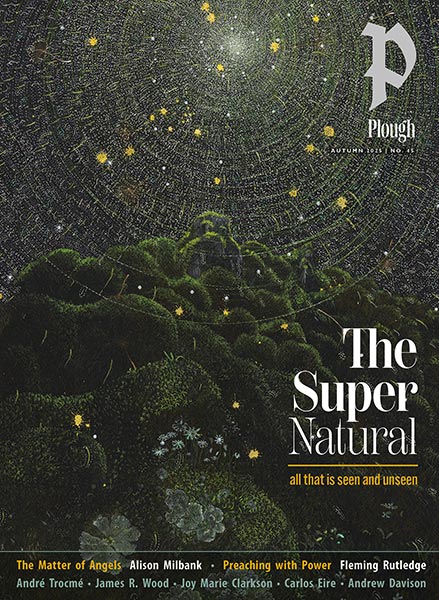Subtotal: $
Checkout-

Arvo Pärt’s Journey
-

Readers Respond
-

Humanizing Medicine
-

The Forgiveness Project
-

The Busted Bean
-

Jakob Hutter, Radical Reformer
-

Covering the Cover: Freedom
-

Disciplines for Freedom
-

The Open Road
-

We Are All Fiddlers on the Roof
-

Bad Faith or Perfect Freedom
-

American Freedom and Christian Freedom
-

Jane Eyre Holds Her Own
-

Becoming a Free Person
-

In Defiance of All Powers
-

Recovering from Heroin and Fiction
-

The Workers and the Church
-

The Body She Had
-

Encounters at the Southern Border
-

A Lion in Phnom Penh
-

Become Slaves to One Another
-

Form and Freedom
-

Paraguayans Don’t Read
-

The Bible’s Story of Freedom
-

The Autonomy Trap
-

An Exodus From China
-

Yearning for Freedom
-

Taking Lifelong Vows
-

Poem: “And Is It Not Enough?”
-

An American Mother Forgives
-

I Cheerfully Refuse Despair

The Glory of God Is a Human Being Fully Alive
In Fully Alive: Tending to the Soul in Turbulent Times, Elizabeth Oldfield uses the seven deadly sins to point towards the seven heavenly virtues.
By Elizabeth Wainwright
January 7, 2025
Next Article:
Explore Other Articles:
It is a gift to be alive, and a fragmenting, anxious world can either numb this knowing or rouse it. As I think of the uncertain future my young daughter will face, I want her to step into her aliveness, to gather courage and live from a deep center, and like a tree with roots sunk deep into the ground, to stay standing when the storms come. I want this for myself too.
Fully Alive is the book I need right now. Its title is from a quotation attributed to Saint Irenaeus: “The glory of God is a human being fully alive.” We are to be rooted in our humanity as well as to hope in heaven, and Elizabeth Oldfield invites us – secular and religious alike – to look with her through the lens of the Christian tradition at the “ancient technologies” that might help us find steadiness and “spiritual core strength.” Her quest is structured, unexpectedly, around the seven deadly sins. “Fully aliveness, for me, is summed up in connection, and my definition of sin is everything working against that.” She unearths sins as modes of disconnection and explores their opposites – qualities to work toward rather than away from: wrath (from polarization to peacemaking), envy (from status anxiety to belovedness), pride (from individualism to community), and so on.
Oldfield offers personal stories, wisdom, and practices that she and generations before her have found helpful: prayer, liturgy, and community. These also act as guardrails for her attention. What we pay attention to is what we will become, and Oldfield wants to become someone who is “growing outwards and upwards into love.” But our attention is fast becoming a commodity, pulling us outward, leaving the inner landscape neglected. Fully Alive tends that landscape.
Until the final chapter, Oldfield uses “[God]” throughout, recognizing that people will bring their own ideas into the space between the brackets. She is not setting out to offer an argument for Christianity, but rather “signposts and support to become the kind of human that I think this world might need.” One of those needs is for people who can depolarize the world. My experience in community work and local politics is that divisions often fade when we get up close, and I wonder if these polarizing times are less about difference itself (essential for life to thrive) and more about the decline in opportunities to encounter people “not like me.” Oldfield shares her experiences of church and the “micro community” her family lives in, structures that offer opportunities to encounter love and resist the tides that threaten to “pull us away from each other.” She also explores this theme in her podcast, The Sacred.
Oldfield is vulnerable as she grapples with questions of how to live (readers may laugh, blush, disagree, empathize), and her relatability brings secular and sacred into closer alignment. Fully Alive is a wise and luminous call to wholeness, to community – to stand in the turbulence between the world as it is and as it could be and trust that we were made for such times as these.
Already a subscriber? Sign in
Try 3 months of unlimited access. Start your FREE TRIAL today. Cancel anytime.









































